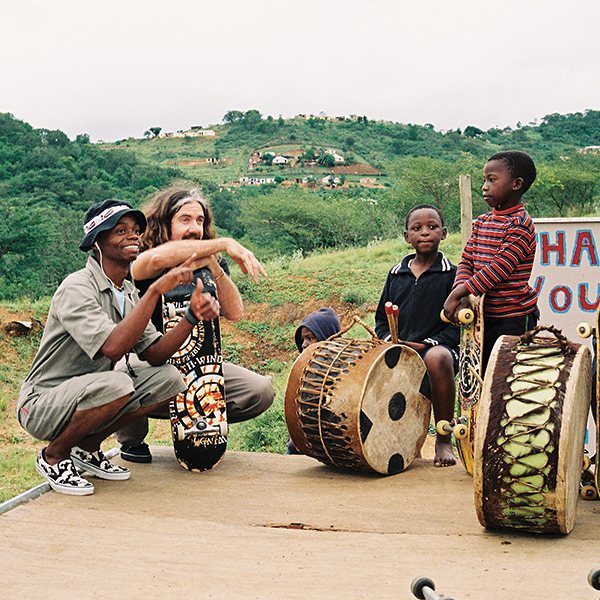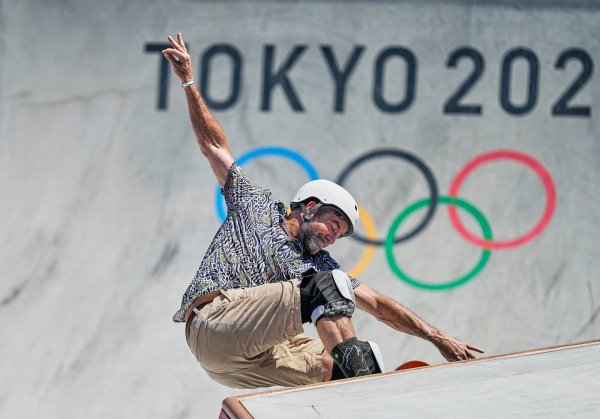With a battered skateboard under his arm and nothing in his pockets, Dallas Oberholzer walked into Isithumba — the Zulu village between Durban and Pietermaritzburg — in 2001. There, he wowed the kids with tricks and flips and in return, South Africa’s skateboarding nomad was gifted a piece of land by the village elders.
By 2009, the piece of land, overlooking the Umgeni river in the Valley of a Thousand Hills, had grown into a homestead comprising tin-roofed huts and a skate park. That year, the youth camp attracted Tony Hawk, the name synonymous with the sport. The American visited the village and was so enamoured by the skills of the Zulu kids that he shipped personalised boards out for them.
A year later, with the country gripped by Fifa World Cup fever, Oberholzer too was revelling in the festivities, skating down the street to the shops when he was arrested.
“I had been arrested for skating before. This time, I was jailed and asked to pay the bail to get out,” Oberholzer tells The Indian Express. “Ten years later, my country asked me to represent it at the Olympic Games. That’s how ridiculous skateboarding could be.”
x-x-x
Oberholzer, 46, competed at skateboarding’s Olympic debut in Tokyo. He was the oldest member of Team South Africa and the second-oldest participant in the youngest sport; Fellow 46-year-old Rune ‘The Danish Destroyer’ Glifberg pipped him by eight months. Oberholzer says the veterans made it a perfect showcase for skateboarding.
“I don’t think ever again there will be a 40-year-old skateboarder at the Olympics. You’d be lucky if a 30-year-old makes it. So, it was just lovely that the introduction to skateboarding was such a mixed bag of people,” he says. “It wasn’t predictable.”
Oberholzer’s men’s park event was won by an 18-year-old from Australia. The combined ages of the podium in the women’s street and park events were 42 and 44 respectively.
“Just like the spin of the universe, the skateboarding universe too spins fast. Things are moving faster and getting more technical. These young athletes from the start, they see things that are really good,” he says. “Whereas when I started, we aimed for things that are very average now. Their progression, their trajectory is just through the roof compared to my steady progression.”
The thick dreadlocks were lopped off last December, making way for sleek, more-salt-than-pepper spikes, but make no mistake, Oberholzer is a skateboarder’s skateboarder. A skateboarder of the 80s vintage. The ‘OGs’ of the game whose skating lingo bleeds into the texts and chats, generously peppered with ‘rad’, ‘gnarly’ and ‘sick’. He has fittingly ‘rad’ tales to tell. The time his jeep got stuck in the mud in the Amazon, and he had to fend off a jaguar by ‘roaring, Tarzaning out at the top of my lungs’. The time he chauffeured Janet Jackson’s dance troupe.
Tennis was the sport of choice for the Johannesburg kid until the family rented Thrashin’ for movie night. The 1986 film is a coming-of-age tale of warring skateboarding gangs, featuring quintessential Californian talents. Josh Brolin was coming off the success of The Goonies. Red Hot Chilli Peppers were two albums, three years old. Tony Hawk had become a prominent name in skateboarding but was still 13 years away from landing the world’s first 900 aerial spin.
The movie left Oberholzer, and a bunch of South African preteens, dreaming of surfing the sidewalks and bringing the American skate culture inland.
“California dreamin’, you know,” Oberholzer laughs. “We realised that this little toy was also a limitless tool. It could take you places, as fast as possible.”
It had taken him to 50 countries but with little to show for it. He moved to Durban to train at a Tony Hawk-designed skate park. The search for ambition and direction brought him to Isithumba in 2001, which remains his on-and-off shelter.
“I am the only white person in a 30km radius. Everybody thinks I’m crazy,” he says. “Everybody wanted to know why I wanted to live there. My parents talked about the negatives of living here but got over it later. Some comments would be backhanded, stuff like ‘good that you are helping the blacks’ but for me, this was a place to have fun, to build a safe space for skaters.”
A white South African schooled separately during the Apartheid era, Oberholzer found black peers during his skating runs, and stirred into action once Nelson Mandela came to power.
“Mandela basically said to everyone in South Africa, do what you can do, share what you have. All I did was share what I had, which was skateboarding and the culture. It helped me get over my Apartheid upbringing,” says Oberholzer. “It was the way to fight the good fight, to show that skateboarding is a legit activity to keep the youth out of trouble. I also was just on a personal mission to get it accepted, because I went through so much ridicule.”
He founded the Indigo Youth Movement and Indigo Skate Camp non-profits, which run youth intervention and after-school skate programmes to keep underprivileged kids away from drugs and gangs. The business graduate who never cared for a proper job helps the community with education and skills training. The free time is spent turning abandoned swimming pools into skate bowls and building ramps.
In Tokyo, Oberholzer noticed how the other skate teams had physios, coaches, and support crew. How Australian Keegan Palmer, who won the gold medal, is from the country with the highest percentage of skateparks, and why Japan’s rise was due to the infrastructure.
 Dallas Oberholze
Dallas Oberholze
Since returning, he has been working away in downtown Cape Town, converting an old Olympic-size pool in the city bowl into a skate ramp.
“These will be attractions for skateboarding enthusiasts to come visit South Africa. After the Olympics, I am also getting calls from Nigeria and other countries to help build some skate parks there,” he says. “These parks will be training grounds for our continent’s future Olympians.”
x-x-x
Skateboarding’s existential crisis — the counterculture, underground-movement-origins and the mainstream-Olympic spotlight — doesn’t faze Oberholzer.
“It was always coming, in the last 10-15 years. Are there still hardcore, punk rock dudes under the bridge? Yeah. There are also skaters bench-pressing, working on the legs. The Red Bull skaters and the metalheads. That’s great. I want every person to have the choice to feel free in their body, and the sport to grow.”
In Tokyo, he represented both worlds.
“I remember hearing that in the Athletes Village, it’s hard to find people. And as soon as I landed, there were rumours that you weren’t allowed to skate inside the village. I was like, ‘yeah, that’s really going to work’,” he cackles. “All I had to do was to listen out my window to hear where the wheels were rolling in. You just had to listen for your tribe.”
During the competition, the young blood turned up in designer, sleek clothes. Oberholzer sported the formal South African opening ceremony zebra-printed shirt. The kids who grew up on the ‘how to’ videos and slow-mo tutorials, showed bravado and dexterity. Oberholzer, who has been skating since before many of the tricks were even invented, was in stark contrast with his smooth, relatively-safer runs. He was classic punk rock against the dizzying techno/EDM. It meant he finished last, but he won something much more valuable.
 Dallas Oberholze was the oldest member of Team South Africa and the second-oldest participant in the youngest sport; Fellow 46-year-old Rune ‘The Danish Destroyer’ Glifberg pipped him by eight months.
Dallas Oberholze was the oldest member of Team South Africa and the second-oldest participant in the youngest sport; Fellow 46-year-old Rune ‘The Danish Destroyer’ Glifberg pipped him by eight months.
“My mum is happy with me,” says Oberholzer, who had earlier remarked that qualifying for the Olympics would perhaps make his disapproving mother proud of his career choice.
“She’s also watching skating movies, the highlight reels from Olympics. She is learning skating vocabulary,” he says. “She wanted me to stop chasing the dream once. It’s awesome to have her blessings. It’s such a good ending, such a beautiful last closure to everything I’ve chased in my life.”
from WordPress https://ift.tt/3gsNzLe
via IFTTT

No comments:
Post a Comment